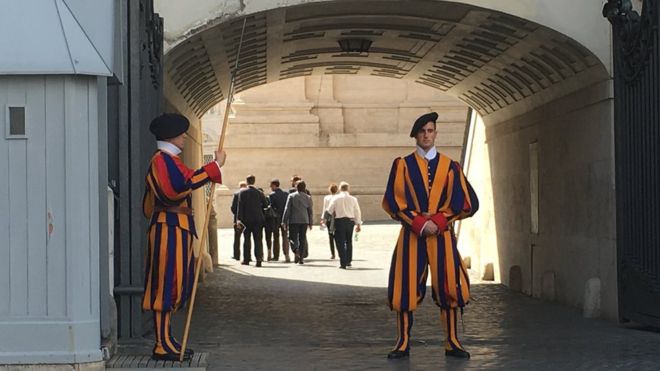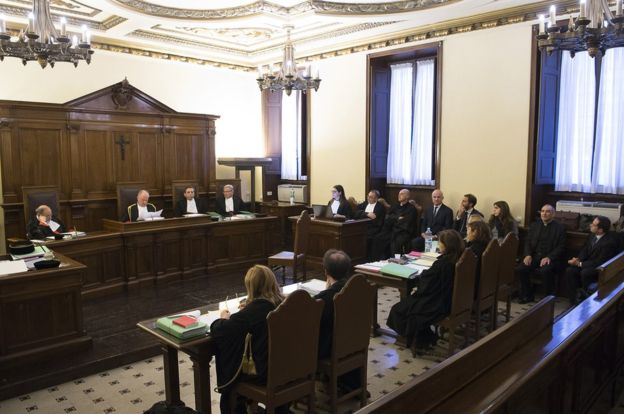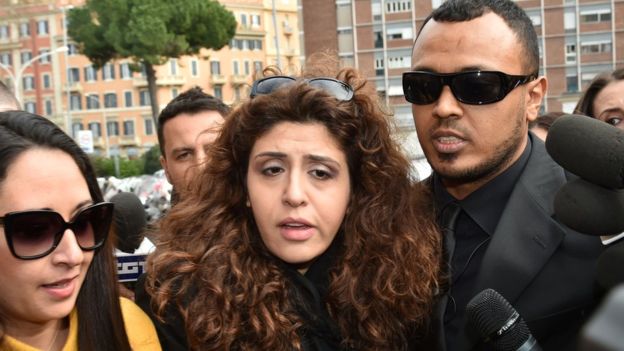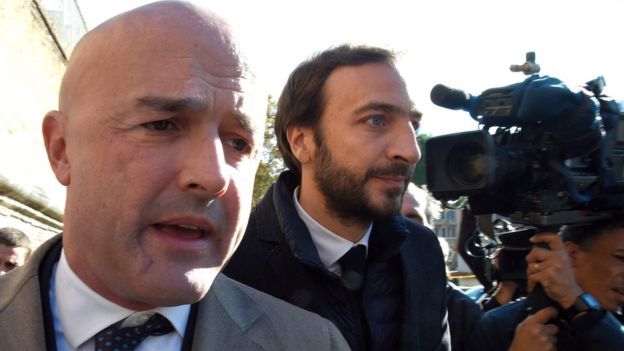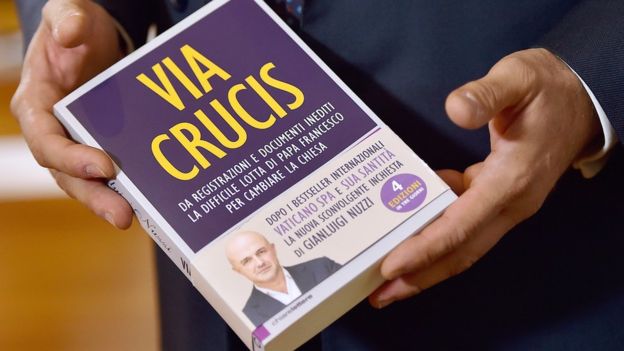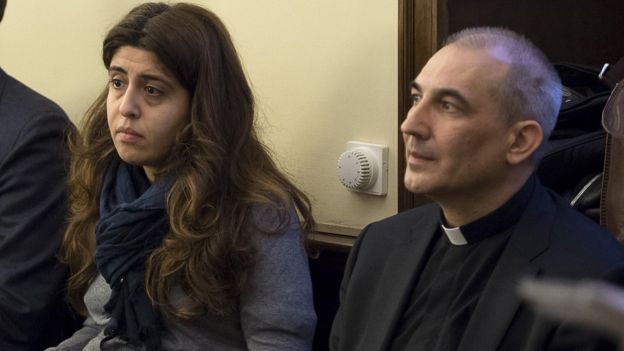Rare View of Vatican Justice in Secrets Trial
By James Reynolds
Next to St Peter's Basilica, two Swiss Guards stood underneath an arch. One carried a sword, the other a spear. The Vatican had evidently calculated that two guards familiar with medieval weaponry would be enough to deter a raid. At the very least, they might be able to duel assailants into a standoff until reinforcements arrived. The guards allowed us into the heart of Vatican City, for a trial that has gripped Italians for weeks. We walked past the Casa Santa Marta, the anonymous-looking guesthouse which doubles as Pope Francis's home. A single Swiss Guard stood at the front door. The Vatican's tribunal building is in the same square. "No mobile phones, no satellite phones, no transmitters," a Vatican official joked - as if we might try to smuggle them in. He led us towards two rows of plastic chairs at the back of a wood-panelled courtroom on the ground floor. The coat of arms of Pope Pius XI was engraved on to the ceiling, flanked by four chandeliers. A crucifix hung on a panel behind the judges' bench - a coincidental reminder for the devout that Jesus Christ was himself condemned by a questionable judicial verdict.
Vatican secrets This trial began in November 2015. The Vatican accuses three officials - Monsignor Lucio Vallejo Balda, his former assistant Nicola Maio, and public relations consultant Francesca Chaouqui - of leaking classified documents from a reform commission set up by Pope Francis. The Vatican also accuses two Italian journalists - Gianluigi Nuzzi and Emiliano Fittipaldi - of soliciting the leaked documents. The crimes carry a sentence of up to eight years in prison.
The leaks concern alleged financial mismanagement in the Vatican - just as the Pope seeks to enact administrative reforms. The defendants dispute the charges. The two journalists question the right of a foreign court to try them for what they consider to be standard journalistic practice - obtaining information from those in power. The trial has been marked by some unusual allegations. Mgr Vallejo says that his co-defendant, Francesca Chaouqui, seduced him in a hotel room in Florence in 2014. He said that the hotel would be able to confirm that it found her night-dress, which he called a "babydoll", in his room. Ms Chaouqui has denied sleeping with the priest, and has questioned his sexual orientation. So it was with some interest that we awaited their arrival in court. The priest arrived first. "I'm very well," Mgr Vallejo told reporters cheerfully. "I'm relaxing! I've had eight months off!" Francesca Chaouqui walked in shortly afterwards. She's expecting a child with her husband and is now close to giving birth. The court arranged an armchair and a pillow for her next to the defendants' bench. She looked for a brief moment in Mgr Vallejo's direction, but did not interact with him. Nicola Maio, another defendant, sat on a bench between them. He dabbed his forehead with a neatly folded tissue. The two remaining defendants, journalists Nuzzi and Fittipaldi, exercised their right not to show up.
A Vatican police officer, armed with a pistol, took his place at the back of the court. We all rose for the entry of the four judges. Each wore a black gown and white ruffles. There are no juries in the Vatican. The judges decide the verdict themselves. Perfect punctuation Some countries' judicial systems take pride in functional settings and gripping examinations. But the Vatican gives the opposite impression. The court's decor and its officials' robes were suitably dazzling. But the examination of witnesses appeared designed to be as dry and repetitive as possible. During the three-and-a-half hour session, the court heard from four witnesses - an official at the Vatican's economy ministry, a doctor who works at the Vatican, a priest and an IT engineer. The first three examinations followed the same procedure: a prosecution or defence lawyer would ask a question, the witness would answer, the judges would jump in, often taking over the examination altogether. After each short exchange, the tribunal's presiding judge, Giuseppe Dalla Torre, would dictate to the court stenographer his own summary of what was said. He took particular care over punctuation. "Insert a comma here, then a full stop," he would routinely instruct the stenographer. At the end of each witness's testimony, an official sitting next to the stenographer would read back to the court the chief judge's summary in full. So everything tended to be said or heard three times, causing some exasperation in the public gallery. Birdsong The five defence lawyers, each representing a single defendant, were given their chance to interrogate witnesses. But the geography of the court did not favour them. Their bench was near the back, meaning that they had to direct their questions to the back of each witness's head.
The three defendants in court each behaved differently. Ms Chaouqui spent much of the session getting up to whisper into her lawyer's ear. Nicola Maio made notes on a carefully folded piece of paper. Mgr Vallejo spent much of his time reacting theatrically to the witnesses' testimony. He appeared to be delighted any time he caught the eye of any of the reporters. As the session went into the early evening, we could hear birdsong from the Vatican gardens outside. Towards the end, the court heard from an expert who had retrieved messages from the defendants' mobile phones and laptops. Judge Dalla Torre admitted that he was not a technical expert. "What's that?" he asked, when the witness started talking about cloud storage. Finally the judge decided it was time to stop. After all, the stenographer needed a rest.
|
.
Any original material on these pages is copyright © BishopAccountability.org 2004. Reproduce freely with attribution.
